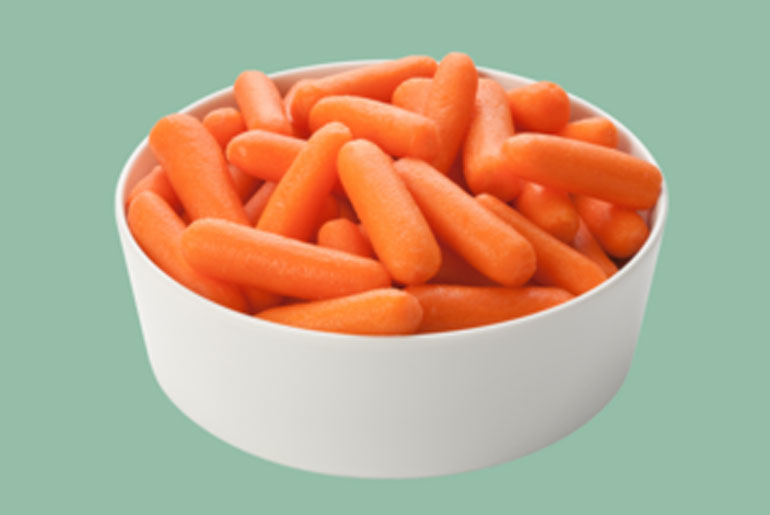Baby carrots are small, tender carrots that are either naturally small or made by cutting larger carrots into smaller pieces. They are known for being convenient, easy to snack on, and nutritious. Baby carrots are rich in vitamins and minerals, particularly vitamin A, which is essential for eye health, as well as fiber, which aids in digestion. They are also a good source of antioxidants, including beta-carotene, which may help reduce the risk of chronic diseases. Baby carrots are low in calories, making them a healthy snack option, and they are often enjoyed raw or with dips like hummus.
“Baby carrots” typically refer to small, immature carrots that are harvested before they reach full maturity. Here are some key points about baby carrots:
- Origin and Preparation: Baby carrots can be either true young carrots harvested early or regular carrots that have been cut and shaped into smaller pieces. The latter are often sold as “baby-cut” carrots.
- Appearance: True baby carrots are small and slender, often with a more delicate texture compared to mature carrots. Baby-cut carrots are shorter, cylindrical pieces that are machine-cut from larger carrots.
- Nutritional Content: Baby carrots retain many of the nutritional benefits of regular carrots. They are rich in beta-carotene (a precursor to vitamin A), fiber, vitamin K1, potassium, and antioxidants like lutein and zeaxanthin.
- Convenience: Baby carrots are convenient for snacking, salads, and cooking due to their small size and pre-cut nature. They are often popular for raw consumption with dips or as additions to lunchboxes.
- Uses: They can be used in various dishes such as stir-fries, soups, stews, and side dishes. Their sweetness and mild flavor make them versatile in both cooked and raw preparations.
- Storage: Baby carrots, like regular carrots, should be stored in a cool, dry place or refrigerated to maintain freshness. Proper storage helps retain their crunch and nutritional content.
Overall, baby carrots offer a convenient and nutritious option for incorporating vegetables into your diet, whether as a snack or a component of meals.
Carotenoids are a group of pigments found in plants, algae, and photosynthetic bacteria. They play crucial roles in both plants and animals, including humans. Here are some key points about their importance:
- Antioxidant Properties: Carotenoids act as antioxidants, helping to protect cells from damage caused by free radicals. This protection can reduce the risk of chronic diseases such as cancer, cardiovascular diseases, and age-related eye disorders.
- Provitamin A Activity: Some carotenoids, like beta-carotene, can be converted by the body into vitamin A, which is essential for vision, immune function, skin health, and proper functioning of organs like the heart, lungs, and kidneys.
- Eye Health: Carotenoids such as lutein and zeaxanthin are concentrated in the retina of the eye and help protect against age-related macular degeneration and cataracts by filtering out harmful blue light and reducing oxidative stress.
- Skin Protection: Certain carotenoids, especially beta-carotene and lycopene, contribute to skin health by protecting it from UV-induced damage, potentially reducing the risk of sunburn and skin cancer.
- Anti-inflammatory Effects: Carotenoids exhibit anti-inflammatory properties, which can help in reducing inflammation throughout the body and supporting overall health.
- Enhanced Immune Response: They may also play a role in enhancing the immune response, promoting immune cell function, and supporting immune system health.
- Dietary Sources: Carotenoids are abundant in fruits and vegetables, especially those that are brightly colored such as carrots, sweet potatoes, tomatoes, spinach, kale, and bell peppers.
Including a variety of carotenoid-rich foods in your diet can contribute to overall health and well-being, offering protection against various diseases and supporting vital physiological functions.
Disclaimer:
The information contained in this article is for educational and informational purposes only and is not intended as a health advice. We would ask you to consult a qualified professional or medical expert to gain additional knowledge before you choose to consume any product or perform any exercise.







